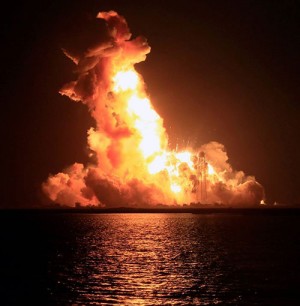
WALLOPS — One week after the spectacular explosion of a significant rocket launch from Wallops Island, Orbital Sciences announced it has made some early determinations on the cause and has vowed to move forward with its aggressive program from the facility on the Virginia shore.
Last Tuesday, Orbital Sciences’ Antares rocket carrying the Cygnus spacecraft to the International Space Station briefly went up as planned at around 6:22 p.m., but the mission was aborted just seconds after liftoff when problems with the launch were detected. Essentially, there were two major explosions, both of which shook houses and rattled windows across the Lower Shore including the resort area as the Antares was first purposely blown up and then fell back to the launch pad.
The Antares was an unmanned rocket and no casualties or injuries were reported. Shortly after the explosion, emergency services from all over the Lower Shore responded to the area in and around Wallops. The Antares measured about 131 feet tall, or about the equivalent of a 13-story building. It was carrying 5,000 pounds of cargo including food, instruments, experiments and other supplies to the International Space Station.
Almost immediately after the failed launch, Orbital Sciences and NASA began joint investigations into the cause of the explosion, but the early phases of that effort were concentrated on retrieving debris and collecting data. This week, Orbital announced while the investigation is ongoing, early indications point to a probable turbo-pump failure in one of the Antares’ main engines.
As a result, Orbital’s use of those engines for the Antares will likely be discontinued. However, Orbital had already been planning to discontinue the use of the Aerojet Rocketdyne AJ26 engines and switch to an upgraded propulsion system for the Antares by 2016.
After last week’s explosion, the private-sector company is now accelerating the implementation of the new propulsion system for the Antares. Orbital hopes to stay on its planned launch schedule from Wallops to the ISS throughout the next year with a rocket different from the Antares until the new propulsion system is ready.
“To maintain the program’s critical ISS supply line, Orbital plans an early introduction of its previously selected Antares propulsion system upgrade in 2016,” a statement from the company this week reads. “This will be preceded by one or two non-Antares launches of the company’s Cygnus cargo spacecraft to the ISS in 2015-2016, employing the spacecraft’s compatibility with various launch vehicles and its flexibility to accommodate heavier cargo loads as launcher capacity permits.”
In addition, Orbital expects repairs to the Mid-Atlantic Regional Spaceport launch complex at Wallops to be undertaken quickly, allowing launch operations to continue with the upgraded Antares in 2016. Orbital has a $1.9 billion contract to fly cargo to the space station and last Tuesday’s failed launch would have been the third in a series of nine planned for Wallops.
“Orbital is taking decisive action to fulfill our commitments to NASA in support of safe and productive operations of the space station,” said Orbital Chairman and CEO David W. Thompson this week. “While last week’s Antares failure was very disappointing to all of us, the company is already implementing a contingency plan to overcome this setback. We intend to move forward safely but also expeditiously to put our CRS cargo program back on track and to accelerate the introduction of our upgraded Antares rocket.”
Orbital this week had a conference call with investors and financial analysts, and although the failed launch from Wallops this week was a setback, officials were minimizing the loss somewhat this week.
“Exact financial impacts to Orbital will depend on which of several specific options for near-term launches is selected, but they are not expected to be material on an annual basis in 2015,” said Thompson. “In all cases, no significant adverse effects are projected in 2016 or future years in part because the cost of the Antares propulsion system upgrade was already part of our internal investment plan during that time.”
In short, despite the failed launch of the Antares from Wallops last week and the subsequent explosions heard and felt across the Lower Shore, Orbital has a plan in place to quickly recover and continue with the resupply missions to the International Space Station. The company is accelerating it program to upgrade the propulsion system for the Antares by 2016 and in the meantime will explore other vehicles to send needed supplies to the ISS.
“We very much appreciate the tremendous support Orbital has received from NASA and Virginia’s MARS commercial spaceport team over the last seven years on our Antares rocket and CRS cargo programs,” said Thompson. “We look forward to working closely with them to quickly recover from last week’s setback.”
